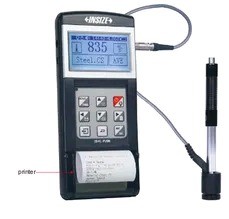Hardness Tester Calibration and Portable Hardness Tester Supplier
The hardness of a material is its resistance to permanent deformation. A hardness tester is used to measure a material’s properties like strength, wear resistance and ductility that aid you to find out if a material or the material treatment is appropriate for the objective you require.
To define, a hardness test finds out the resistance a material shows to permanent deformation through penetration of another harder material. It is vital to know that hardness is an empirical test and hence not a material property.
A hardness test is carried out by pressing particularly dimensioned and loaded object (indenter) on the surface of the material you want to test. Then hardness is measured through:
- Depth of indenter penetration
- Measuring the size of impression an indenter left
- Particular loading time and load duration.
There are varied hardness tests that mainly fall in three categories below:
- Resistance to indention
- Elastic hardness
- Resistance to cutting or abrasion
Certain factors that impact hardness testing
Generally, numerous factors impact the hardness test results. The rule is lower the load utilized in hardness test, then more factors you require to control ensuring result is accurate after the hardness test.
Some vital factors to keep in mind for accurate result from a hardness test are:
- External factors like dirt, light, vibrations, humidity and temperature must be controlled.
- Tester and stage must be secured on a robust horizontal table and the sample must be held or clamped to an anvil or holder.
- The indentor must be perpendicular to tested surface.
- Hardness tester must be re-calibrated and checked whenever the indenter or objective lens is changed.
Conclusion
To maintain accuracy and flawless results from hardness test performed, a hardness tester should be calibrated at regular intervals from an accredited NABL lab such as Prism Calibration Center.







